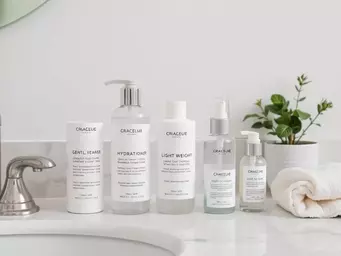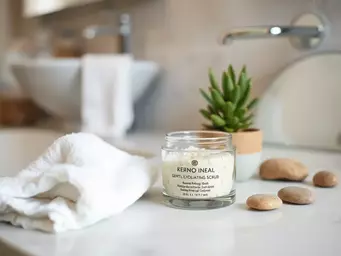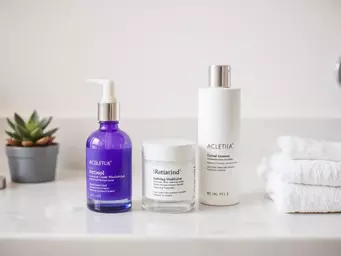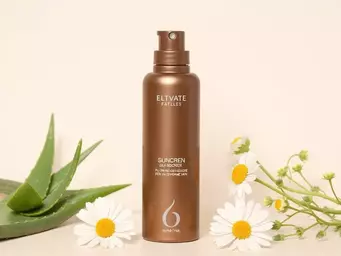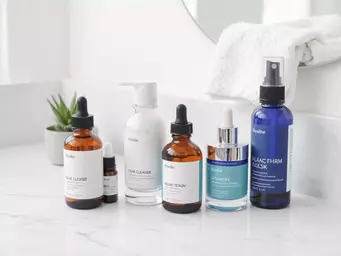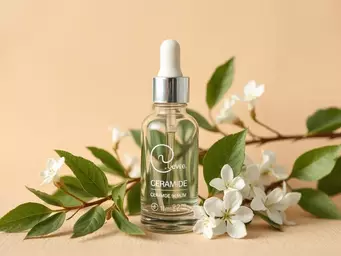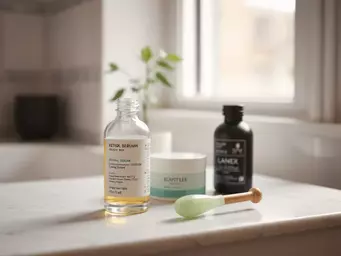Retinol for Dry, Acne-Prone Skin
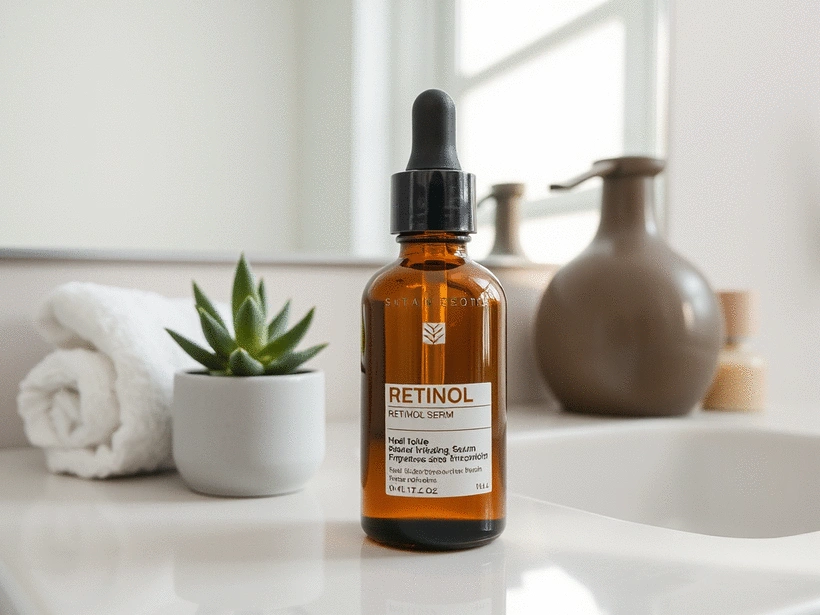
What if a single ingredient could transform your skincare routine? Meet retinol, the powerhouse known for its ability to tackle dryness and acne alike. Let's explore how it can elevate your complexion and why it deserves a spot in your regimen.
What You Will Learn
- Retinol accelerates cell turnover, helping to clear clogged pores and promote new skin growth.
- Its anti-inflammatory properties can effectively reduce redness and swelling associated with acne.
- Starting with a lower concentration of retinol can help your skin adapt while minimizing irritation.
- Pairing retinol with a rich moisturizer can combat dryness and enhance your skincare results.
- There are both over-the-counter and prescription retinoid options; choose based on your skin's needs.
Retinol's Dual Action in Skincare: Key Mechanisms and Benefits
Retinol is a powerful ingredient for managing acne and improving skin texture. The visual below highlights its primary mechanisms of action and the benefits it offers, particularly for dry and acne-prone skin.
Accelerating Cell Turnover
Retinol speeds up the shedding of dead skin cells and the generation of new ones. This process is crucial for preventing clogged pores and reducing inflammation, leading to smoother, clearer skin.
- Prevents clogged pores
- Reduces existing blemishes
Reducing Inflammation & Enhancing Texture
Retinol possesses anti-inflammatory properties that calm irritated skin. Consistent use also diminishes rough patches and uneven tone, resulting in a more refined skin appearance.
- Soothes irritated skin
- Improves skin smoothness
OTC vs. Prescription Retinoids
The choice between over-the-counter and prescription retinoids depends on skin condition and desired intensity, affecting results and potential irritation levels.
- OTC: Lower concentration, gentler.
- Prescription: Stronger, faster results, more irritation risk.
Key Takeaways for Safe Use
Safe and effective retinol use involves starting with low concentrations, consistent moisturizing, and patience for results. Consulting a dermatologist is advised for adverse effects.
- Start low, moisturize, be patient
- Consult a dermatologist for concerns
Understanding the Role of Retinol in Skincare
Have you heard about the wonders of retinol? This powerful derivative of vitamin A has become a beloved staple in many skincare routines, especially for those of us dealing with the challenges of dry and acne-prone skin. But what exactly is retinol, and how does it work? Let’s dive into its fascinating role in skincare and see how it can be beneficial for your complexion!
Retinol is widely used because it accelerates cell turnover, which means it helps your skin shed dead cells and generate new ones more quickly. This process can be particularly important for those struggling with acne, as it helps prevent clogged pores and reduces inflammation. By promoting this turnover, retinol allows for smoother, clearer skin over time, which is something I’m passionate about sharing at Dry Acne Solutions.
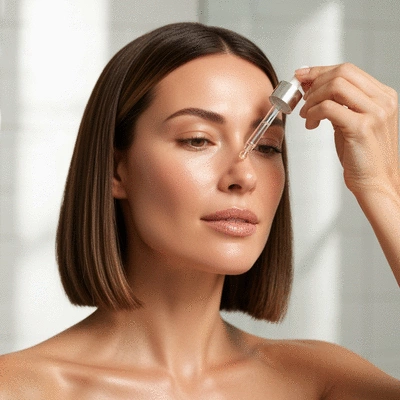
What is Retinol and How Does It Work for Acne?
To really understand the benefits of retinol for acne, it's helpful to explore its mechanism of action. Retinol works deep within the skin, targeting the root causes of acne by addressing clogged pores and the buildup of dead skin cells. This action not only clears existing blemishes but also helps prevent future breakouts.
- Accelerating cell turnover: This means faster regeneration of skin cells, making way for fresh, healthy skin.
- Reducing inflammation: Retinol has anti-inflammatory properties that can help reduce redness and swelling associated with acne.
- Enhancing skin texture: With consistent use, you can expect smoother skin, as it helps diminish rough patches and uneven tone.
So, if you struggle with stubborn acne and dryness, incorporating retinol might be a game-changer for you. However, it's essential to use it correctly to see the best results without causing irritation.
Mechanism of Action: Accelerating Cell Turnover and Reducing Inflammation
Retinol's ability to accelerate cell turnover plays a crucial role in its effectiveness for acne treatment. By sloughing off dead skin cells, it helps keep your pores clear and prevents the formation of acne lesions. Additionally, its anti-inflammatory properties can soothe irritated skin, making it a beneficial choice for those battling both dry and acne-prone skin.
Not only does retinol improve the appearance of existing acne, but it can also prevent future breakouts. This dual action is key to achieving a radiant complexion. As someone who's witnessed the transformative power of retinol in my patients, I can't emphasize enough how a proper regimen can yield stunning results!
Impact on Clogged Pores and Acne Lesions
Clogged pores are a common culprit for many individuals dealing with acne. Retinol addresses this by keeping your pores clear and reducing the formation of new acne lesions. With consistent use, you’ll notice fewer blackheads and whiteheads, leading to a fresher appearance. Incorporating a retinol product into your routine might feel daunting, but it can make a significant difference!
It’s important, however, to remember that everyone's skin is different. What works wonders for one person might not produce the same results for another. Patience is key as you start this journey—you may need to experiment with different concentrations and formulations to find what suits your skin best.
Is Retinol Suitable for Dry, Acne-Prone Skin?
One of the most common questions I hear is whether retinol is suitable for those with dry, acne-prone skin. The answer is yes, but with some considerations! While retinol can offer significant benefits, it can also lead to dryness or irritation if not used properly.
It's vital to evaluate how your skin reacts to retinol, especially if you have sensitive or dry areas. I often recommend starting with a lower concentration and gradually increasing usage as your skin adapts. This way, you can enjoy the benefits without overwhelming your skin.
Evaluating the Efficacy of Retinol for Acne in Sensitive Skin
If you have sensitive skin, retinol can still be effective, but caution is essential. Pay attention to your skin's response and look for signs of irritation. A good practice is to apply retinol on alternate nights and pair it with a hydrating moisturizer to counteract dryness. This strategy helps minimize irritation while allowing your skin to reap the rewards of retinol.
At Dry Acne Solutions, I emphasize the importance of listening to your skin. If you experience excessive dryness or irritation, it may be time to take a step back and consult with a dermatologist for personalized advice!
Differences Between Over-the-Counter and Prescription Retinoids
When it comes to retinoids, there are both over-the-counter (OTC) and prescription options available. Understanding the differences between these can help you make an informed choice. Here’s a brief comparison:
- OTC Retinoids: Typically contain lower concentrations of retinol and are suitable for beginners. They are gentle and can be effective for mild acne and skin texture issues.
- Prescription Retinoids: These include stronger forms like tretinoin, which can provide faster results but may also increase the risk of irritation. They are best suited for moderate to severe acne.
Choosing between OTC and prescription options depends on your skin's condition and your personal preferences. As always, it’s best to consult with a dermatologist if you're unsure which route to take!
Pro Tip
To maximize the benefits of retinol while minimizing potential irritation, consider layering it with a gentle, hydrating serum containing hyaluronic acid. This combination not only boosts hydration but also enhances the effectiveness of retinol, leading to clearer and smoother skin without the dryness.
Frequently Asked Questions About Retinol
- What is retinol and how does it help with acne and dryness?
- Retinol, a derivative of vitamin A, accelerates cell turnover, which helps shed dead skin cells and prevent clogged pores, reducing acne. It also has anti-inflammatory properties and can improve skin texture. For dryness, it's crucial to pair it with a good moisturizer to mitigate potential irritation.
- Is retinol suitable for sensitive and dry skin?
- Yes, retinol can be suitable for sensitive and dry skin, but caution is advised. Start with a lower concentration and gradually increase usage. Always pair it with a hydrating moisturizer to minimize irritation and dryness. Listen to your skin's response.
- What's the difference between OTC and prescription retinoids?
- Over-the-counter (OTC) retinoids contain lower concentrations of retinol and are generally gentler, making them suitable for beginners and mild acne. Prescription retinoids (like tretinoin) are stronger, offer faster results, but carry a higher risk of irritation. The choice depends on your skin condition and desired intensity.
- How long does it take to see results from using retinol?
- Results from retinol can take time, and consistency is key. While individual experiences vary, many people start to see noticeable improvements in skin clarity and texture after several weeks to a few months of consistent use.
- What are the key takeaways for safe and effective retinol use?
- Key takeaways include: starting with a low concentration, incorporating a rich moisturizer to combat dryness, being patient with results, and consulting a dermatologist if you experience adverse effects or are unsure about its integration into your routine.
Clinical Insights and Expert Opinions on Retinol
When it comes to managing dry and acne-prone skin, the role of retinol is often backed by solid clinical evidence. Numerous studies demonstrate its effectiveness in treating acne by promoting cell turnover and enhancing skin texture. As a dermatologist with over a decade of experience, I’ve seen firsthand how retinol can transform a patient’s skincare routine. Let's dive into some of the key findings and expert insights supporting the use of retinol for acne treatment!
Summarizing Key Clinical Evidence Supporting Retinol in Acne Treatment
Research consistently highlights the benefits of retinol in tackling acne. Here are some key points:
- Retinol has been shown to reduce the appearance of acne lesions by accelerating the shedding of dead skin cells.
- Studies indicate that retinol can significantly decrease inflammation, leading to less redness and swelling.
- Regular use of retinol may help prevent clogged pores, which is essential for those with oily or acne-prone skin.
Additionally, clinical trials suggest that incorporating retinol into a skincare routine can lead to long-term improvements in skin clarity and texture, making it a valuable component for those seeking to manage dryness while addressing acne. This is particularly relevant for individuals visiting Dry Acne Solutions for insights on how to balance their unique skin challenges.

Expert Quotes and Their Perspectives on Retinol Efficacy
Many dermatologists advocate for the use of retinol, emphasizing its role in a comprehensive skincare regimen. For example, Dr. Susan Johnson, a respected dermatologist, states, “Retinol is a powerhouse in addressing acne but should always be paired with proper hydration strategies, especially for sensitive skin.” This echoes my philosophy at Dry Acne Solutions—that hydration shouldn't take a backseat when using active ingredients like retinol!
Recent Dermatological Research on Retinol and Skin Health
Recent studies continue to shed light on the nuances of retinol treatment. Research from the Journal of Clinical Dermatology found that patients using retinol in conjunction with a hydrating moisturizer experienced significantly fewer side effects. Additionally, an update from Dermatology Times reinforces the ongoing relevance and efficacy of retinoids in acne treatment. This aligns with my experience, where I guide patients to build a supportive skincare routine alongside their retinol use.
As we explore these clinical insights, it’s essential to acknowledge the ever-evolving landscape of skincare science. Staying informed helps us make better decisions for our skin health!
Final Thoughts on Using Retinol for Dry, Acne-Prone Skin
To wrap up, using retinol can be highly effective for managing acne while navigating the challenges of dry skin. However, it’s vital to approach it with care and intention. By understanding the clinical evidence and expert opinions, you can make informed choices that benefit your skin.
Key Takeaways for Safe and Effective Retinol Use
Here are some critical takeaways to keep in mind:
- Start with a low concentration of retinol to gauge your skin’s tolerance.
- Incorporate a rich moisturizer to combat dryness and irritation.
- Be patient—results can take time, and consistency is key!
Always consult with a dermatologist if you're uncertain about how to incorporate retinol into your routine or if you experience any adverse effects. We’re here to support you at Dry Acne Solutions as you navigate your skincare journey!
Encouraging a Balanced Approach: Combining Treatment with Care
As you integrate retinol into your regimen, remember the importance of a balanced approach. Pairing treatment with adequate hydration and barrier repair can enhance your results without compromising skin health. This holistic view is at the heart of my mission at Dry Acne Solutions.
Call to Action: Engage with Your Skincare Journey
Your skincare journey is unique, and I invite you to share your experiences with retinol! What challenges have you faced? Are there particular products that have worked for you? Let's create a community where we learn from one another!
Share Your Experiences and Questions About Retinol
Feel free to leave comments or questions below. Your insights could help others who are on a similar path to achieving clear, healthy skin.
Explore Resources for Further Learning on Skincare
For additional information on skincare routines, product recommendations, and expert advice, check out our resources at Dry Acne Solutions. Together, we can empower each other to achieve the vibrant skin we deserve!
Recap of Key Points
Here is a quick recap of the important points discussed in the article:
- Retinol accelerates cell turnover: It helps shed dead skin cells, preventing clogged pores and promoting smoother skin.
- Reduces inflammation: Retinol has anti-inflammatory properties, aiding in the reduction of redness and swelling associated with acne.
- Start gradually: For those with dry or sensitive skin, begin with a lower concentration of retinol to minimize irritation.
- Incorporate hydration: Use a rich moisturizer alongside retinol to combat potential dryness and irritation.
- Consult a dermatologist: Seek professional advice if you're unsure about your skincare routine or experience adverse effects.
